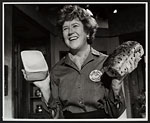Much has been written about the legacy of Julia Child, who would have turned 100 years old thisweek. Many of her colleagues and admirers have posted their Julia recollections and tributesonline. In my role as president of Les Dames d’Escoffier New YorkI have responded to a number of questions on what she meant to the food and beverage industry and to women who work in the field, which is significant. People have shared their favorite recipes from her cookbooks, most notably Mastering the Art of French Cooking.
But as someonewith both a palate andpassion for good food who professesto beneither a professional chef or home cook, just awoman lucky enough to have wonderful people inher life who enjoy cooking for her, my lessons from Julia are not about cooking.
I was fortunate in my life to have connected with Julia on several occasions in my role as Awards Director for The JamesBeard Foundation, escorting her to media interviews, working with her on her script for various shows and producing a tribute in her memory after she left us.She was a towering woman in height and in personality, and I admired her for many reasons that did not necessarilyall have to do with food.
I admired Julia as a role model. Here was a woman who found her passion for fine food while living in Franceandpursued serious cookingin her late 30s. She published her first cookbookin her 50s and went on to become a television star long after many much younger women today are deemed to old for the screen. Her book had been turned down multiple times until it met the keen eye of Editor Judith Jones, but she did not let rejection turn into dejection. Julia demonstrated that a late bloomer can really blossom into something wonderful.
Julia’sheight, her voice, her looks were uniquely her own and she played them up well. Today, it seems so many women need to alter their lookstofeel comfortablewith themselves.
Julia, like me, was a breast cancer survivor and at a time when the survival statistics were not as good. She faced it; beat it and livedto 92eating and drinkingwhatever she wanted. Julia did not live her life in fear; she feasted on enjoying it and the company around her. Today so many of us live under a fear factor with food. Julia did not.
Juliakept her sense of humor and connection with the common man even when surrounded by fawning fans. I would watch her navigate anevent with people peeling away staring in awe at her, reaching out to touch her. Shedid not have body guards like some TV chefs atfood festivalsor give off airs of culinary superiority. She was real, and her TV show, TheFrench Chef,was the kind of “reality” showI would choose to watch today rather than thecrap we now haveon TV. If she made mistakes on the set, she acknowledged them and wiped them away with a sense of humor. We should all learn to wipe away our mistakes with a sense of humor rather than dwell on them.
Julia had a healthy marriage with her beloved Paul, and they made a great team. How lucky to have someone stand by you through thick and thin as you find your true calling in life!Paul was the flame that ignited not only Julia’s passion but also her stove.He loved to eat well; she learned tocook to make himhappy.
So as a born again foodie who prefersolive oil and veggies over beurre and boeuf, Imay or may not master any of the recipes in Mastering the Art of French Cooking. But I have learned onerecipe from Juliathat I will continue totry andmaster:
Mixone partpassion, 1 part sense of humor, 1 part self confidence, 1 part survivor instinct and 1 partinquisitiveness. Mix with a generous dose of love from the right person and add alot of spice. Serve and share with friends.
Photo by Paul Child “The French Chef Episode 255” The Schlesinger Library










